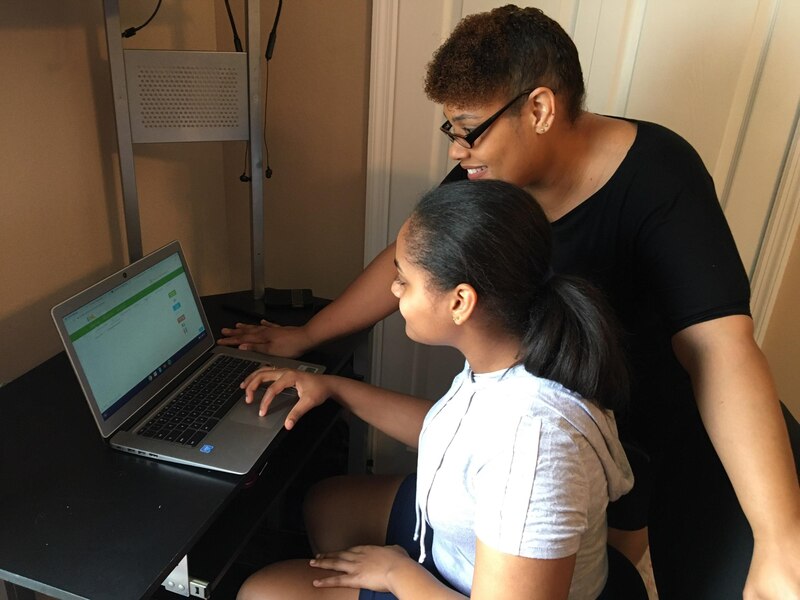Christine Madhere recently got a surprising notification. Though her daughter is typically a strong student, her grade in English class slipped to a D after she failed to submit reading logs about a book of her choice.
“She hasn’t found the motivation to actually read her book,” said Madhere, the parent association president at her eighth-grade daughter’s school, Manhattan’s School for Global Leaders. “She speaks with her friends on the phone, but her life has changed completely” in light of the coronavirus pandemic that has forced school buildings to close. “This is a totally emotionally wonky situation.”
The teacher reassured Madhere (out of her daughter’s earshot) that she is being lenient with students who don’t turn in work. Still, “I don’t want to tell her it won’t count,” Madhere said, fearing her daughter’s motivation will evaporate.
Similar situations are playing out across the city, as teachers wrestle with setting expectations without penalizing students struggling to access remote learning. Some students may have trouble getting online, while others face trauma associated with the pandemic or the added responsibility of caring for siblings. Pointing to those issues, the city’s education department has urged schools to be flexible with their grading policies.
But unlike many other large American school districts, New York City officials have not yet issued a systemwide policy that would bar schools from lowering students’ grades if their work is incomplete.

Chicago has already instituted a “no harm” policy where students’ grades can only improve during remote learning, in line with state guidance. In Denver, high school students can opt-in to receive letter grades but cannot receive an F, or they can choose to take a class for credit or no credit. San Francisco officials have proposed a simple answer: just give every student an A.
Students’ grades can influence a range of outcomes, from whether a student is held back a year to their chances of attending a selective college. But the debate about grading is especially consequential in New York City, partly because a large share of middle and high schools have selective admissions that factor in student grades.
If some schools continue to grade students, that could put low-income students at a greater disadvantage in a competitive admissions process that some argue is already tilted in favor of families with time and resources. Students from low-income families are less likely to have the technology and internet access necessary for online lessons, forcing them to rely instead on paper packets; these students are also more likely to have relatives who have succumbed to the virus or are facing steep economic repercussions and may be doubled up in apartments or in temporary housing.
“If you’re going to use middle school grades as one of the criteria for access to selective high schools, it’s going to be ugly if there are different grading practices across the middle schools,” said Aaron Pallas, a professor at Teachers College. “The playing field is even more unequal than usual right now.”
But changing middle and high school admissions may pose logistical challenges, since schools have lots of autonomy to set their own admissions standards. The education department has been reluctant to mandate new admissions systems as a tool for addressing school segregation. Certain selective schools tend to serve fewer low-income students and students of color. Advocates have demanded that New York City, home to some of the nation’s most segregated schools, reform school admissions to foster integration.
City officials said more guidance about grading and admissions will be issued soon. “Right now the first focus, again, is to help the seniors who can graduate, maximize the online learning, and getting those devices in the hands of kids who don’t have them yet,” Mayor Bill de Blasio told reporters. “And then we’ll definitely make sense of the grading issue and talk about it publicly,” adding that the city is considering a “no harm” policy that would not allow student grades to fall.
For now, city officials have said attendance should not be used to grade students or make promotion decisions during remote learning, and added that schools can review student work to help make decisions about whether they’re ready for the next grade level.
New York state officials have not issued grading guidance and the state’s education department declined to say whether they plan to do so.
Lessening the impact of grades, while perhaps necessary, may also yield unintended consequences, some parents and educators worry.
Jessica Ross, a science teacher at Brooklyn’s Midwood High School, said she has mixed feelings about eliminating grades. Some of her students have gone the extra mile in their studies, and she worries they won’t be rewarded.
But Ross is more worried about students who may simply drop their work entirely. “If I tell all my children they don’t have grades that matter, what are they going to do? They’re not going to do anything,” she said. “I’m not sure what the right answer is.”
Ross is being flexible with her students and is trying to check in with each of them, especially if they’re missing assignments. “I’m emailing each of my children, ‘are you okay, are you safe, are you healthy,’” she said. “It’s hard, it’s a lot of work, and I haven’t finished all my kids.”
Naomi Peña, a parent leader in Manhattan’s District 1 who has four children in city schools, said assessing students right now should be about identifying who will need additional help when school buildings reopen.
“Not everyone is going to be in the same place when they walk in the door in September,” she said.
Even though two of Peña’s children will be eligible for the middle or high school admissions process next year, the question of whether their grades will count is not high on her list of concerns.
“There are larger things I worry about, and grading policy is not one of them,” she said.







